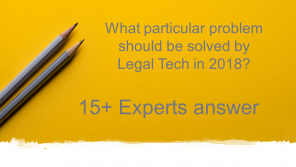Are we headed for a future of robot lawyers, online judges, mechanical mediators, cyborg litigators and android attorneys?
Reading some recent media headlines, you would think so. Last year in Dublin, a conference warned that lawyers must ‘cut fees or face a future led by robots’.
In fact, headlines have been predicting this onslaught of the machines ever since IBM’s Watson (a question-answering supercomputer) beat two human Jeopardy! champions on the US gameshow in 2011.
But it’s not just the press – many practitioners see the same future. Nearly half of law firm leaders who responded to the 2015 Altman Weil survey said they could envision a ‘law-focused “Watson”’ replacing paralegals within 5 to 10 years, while 35 percent saw first year associates being replaced.
But is the robot take-over likely? Or is it predicated on science-fiction headlines without foundations in reality?
The truth is somewhere in between. Some aspects of legal work have already become automated. One area, predictive coding, helps lawyers review extremely large volumes of documents by using algorithms to identify which ones are relevant. Lawyers label an initial set of documents to “teach” the computer what to look for. The computer then automatically reviews the remaining documents with great accuracy. Predictive coding is faster, cheaper, and more reliable than human document review. It’s now mainstream – courts in the U.S., Ireland, and England have expressly approved its use for discovery.
At Brightflag, our platform uses AI technologies to automatically read invoice narrative lines and use the data to help corporate legal departments control costs – something previously only possible with human review.
A.I. is also affecting other areas in the legal space. ROSS Intelligence are developing a legal research tool using a machine learning platform based on the Jeopardy-beating Watson. They focused first on Canadian employment law, and are now teaching it to answer questions on US bankruptcy law. Neota Logic, another AI-focused company, helps build legal applications that can answer legal questions by incorporating the reasoning of lawyer/programmers independent of lawyer input.
But is it likely these innovations will lead to machine-led redundancy in the legal profession?
Not really, says the New York Times. In December 2015, more people were employed in the United States than at any point in history. Over 1,200 jobs were added to US legal industry last month. Technology is changing jobs, not taking them. Hysteria surrounding AI is fueled by a failure to understand the difference between automating tasks and automating jobs.
A study by Professors Dana Remus and Frank Levy, entitled ‘Can Robots be Lawyers?’, backs up this point of view. It says that only about 13% of legal work is likely to become automated in the future.
Predictive coding, for example, is unlikely to wipe out most of the human elements of document review. Experienced lawyers still need to “teach” computers what documents to look for. The technology can’t deal with unstructured due diligence tasks or identify unexpected information.
Similarly, machines aren’t likely to undertake legal research anytime soon either. Watson may be better than humans at answering simple factoid-based questions, but the study says AI still struggles with conceptual queries that need an understanding of context or linguistic subtleties.
Of course the aspects of a lawyer’s job that rely on human interaction will remain immune from automation, at least for now. Creativity, flexibility, and emotional intelligence are crucial to successfully interviewing witnesses, negotiating with opposition, and persuading judges and juries. Machines can’t do this now, but we can’t make predictions about future capabilities.
Data scientist Paul Hastings says that computers will never be capable of creativity or imagination, at least as we understand it. Computers simply do as they are told. They lack an essential ingredient of every good legal argument: ingenuity.
But prognosticators of the future have always predicted that computers would “never” be able to do some of the things they now accomplish. AlphaGo, an A.I. system created by Google’s DeepMind, recently beat a Go grandmaster in the ancient Chinese board game. Go is a game based mainly on reaction and intuition, suggesting computers may be capable of using machine learning to develop something resembling human ingenuity.
Ultimately, clients will refuse to pay humans for routine legal work if machines can do it cheaper, faster, and more reliably. Robot lawyers are a long way off, but robot-enabled lawyers are capable of doing better work more efficiently than ever before. That’s the real future.
This article was also published on LinkedIn by Ian Nolan and is re-published here with the permission of the author. The information and views set out in this article are those of the author alone.
The author has a long track record in legal technology, previously running a successful matter management company before starting Brightflag. Ian leads product development in Brightflag and heads up the EU operations.



